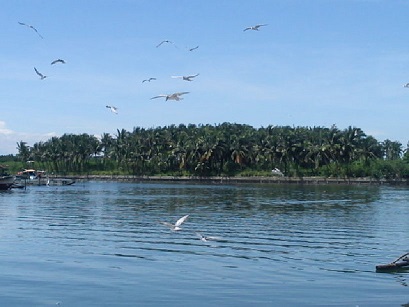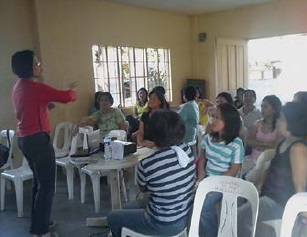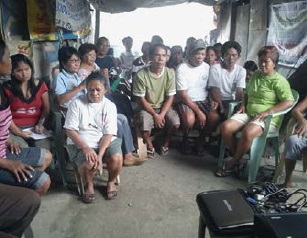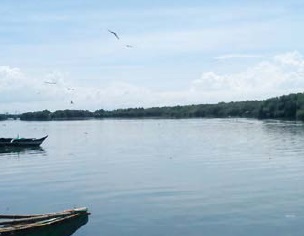Survey on the Socio-Economic and Environmental Impact of the Manila Bay Reclamation Project in the Coastal Areas of Paranaque and Las Pinas:"Will the Expected Benefits Outweigh the Costs?"
 |
Progresibong Alyansa ng mga Mangingisda sa Pilipinas (PANGISDA) |
 |
Pablo Rosales |
 |
|
 |
JPY 250,000 |

Last natural coast in Manila Bay

Focus group discussion for woman

Focus group discussion for fishers

Scheduled areas for reclamation
Research Background
The survey aims to study the social, economic and environmental cost of a large coastal reclamation project such as the Manila Bay Reclamation Project being undertaken by the national government with private corporations eyeing business in the Manila Bay area. Manila Bay is an important historical, cultural and economic resource of the Philippines. Around 30 percent of the country's population resides in the Manila Bay watershed area, and contributes as much as 52.5 percent of the national GDP. It is bordered by the coastal cities and municipalities of the National Capital Region or NCR (Manila, Pasay, Paranaque, Las Pinas, and Navotas), and the coastal provinces of Bataan, Pampanga, Bulacan in Region 3, and Cavite in Region 4. Hundreds of hectares of Manila Bay have already been reclaimed over the last 30 to 40 years and only the coastlines of Paranaque and Las Pinas remain as the last natural coastlines in Metro Manila. Presently, there is a plan to reclaim some more in the coastal areas of the cities of Paranaque and Las Pinas, the project would reclaim around 635.14 hectares. In the past, studies have been made on the various threats (from different factors) facing the natural environment of Manila Bay - effects of overpopulation, pollution etc. but assessments on the impact of reclamation projects on the ecosystem are rarely made.
Reclamations have led to uncontrolled coastal development and habitat degradation. Projects, both on-going and planned such as the Paranaque and Las Pinas Reclamation Projects should be reassessed. The study aims to surface the true impacts of reclamation projects on the quality of life and economic well-being especially of the people living around the Manila Bay watershed.
It is intended to shed light on whether such reclamation and the purpose for these reclamations will benefit the coastal communities or create social and economic displacements and further degradation of the natural environment. What are the social, economic, cultural and environmental trade-offs associated with coastal reclamation? Do the expected benefits of such project outweigh the costs?
Social, economic and environmental costs are not often considered when the feasibility of reclamation projects are evaluated. This is the reason why, more often than not, development policies, programs and projects end up to be inappropriate and lead to unnecessary depletion, degradation and over-exploitation of natural resources. Knowing what and how large the costs are can help provide conclusions relating to the economic feasibility of such projects and maybe make a difference in the decision process on whether to proceed or not with the proposed reclamation.
[Sep. 2011]
Final Report (abstract)
Presently, the reclamation issue is a highly debated issue among the local populace. While the local government is supporting it, and have, in fact, facilitated issuance of permits and clearance certificates for contractors, local folks have been complaining that they were not involved in the decision-making process. They argue that the reclamation project could have an irreversible impact to the environment, biodiversity and livelihoods of people not just in the two municipalities but all those living within the Manila Bay watershed, approximately 30% of the country's population. In this on-going debate, some basic questions need to be answered - "Is it worth to repossess land for business corporations but in the process dispossess the fishers and other communities dependent on Manila Bay of their livelihood?" ; "In the name of 'urban development' and 'integrated cities', should we allow the disintegration of the ecosystem? In the past, studies have been made on the various threats (from different factors) facing the natural environment of Manila Bay - effects of overpopulation, pollution etc. but assessments on the impact of reclamation projects on the ecosystem are rarely made.
Reclamations have led to uncontrolled coastal development and habitat degradation. Projects, both on-going and planned such as the Paranaque and Las Pinas Reclamation Projects should be reassessed. This is the objective of the PANGISDA project - to surface the true impacts of reclamation projects on the quality of life and economic well-being especially of the people living around the Manila Bay watershed.
The "Survey on the Socio-Economic and Environmental Impact of the Manila Bay Reclamation Project in the Coastal Areas of Paranaque and Las Pinas: "Will the Expected Benefits Outweigh the Costs?" is intended to shed light on whether such reclamation and the purpose for these reclamations will benefit the coastal communities or create social and economic displacements and further degradation of the natural environment. What are the social, economic, cultural and environmental trade-offs associated with coastal reclamation? Do the expected benefits of such project outweigh the costs?
Social, economic and environmental costs are not often considered when the feasibility of reclamation projects are evaluated. This is the reason why, more often than not, development policies, programs and projects end up to be inappropriate and lead to unnecessary depletion, degradation and over-exploitation of natural resources. Knowing what and how large the costs are can help provide conclusions relating to the economic feasibility of such projects and maybe make a difference in the decision process on whether to proceed or not with the proposed reclamation.
[Mar. 2013]
Others
